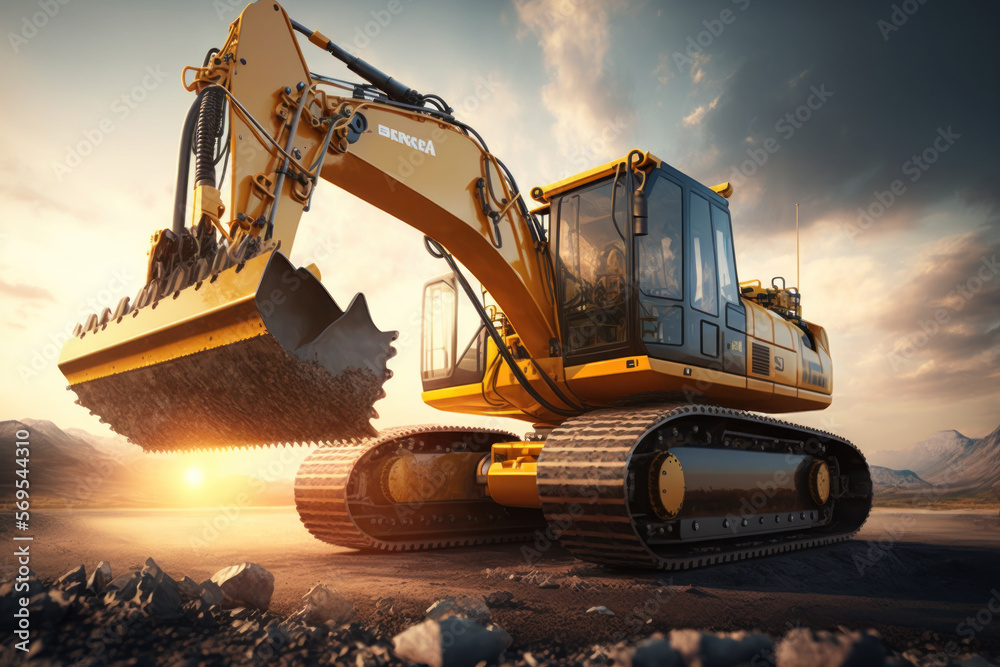Key Takeaways
- Excavators are essential for various construction tasks, from digging foundations to demolishing structures.
- Understanding different types of excavators can help select the right equipment for specific projects.
- Safety and maintenance practices are crucial for the effective use of excavators.
Modern construction projects rely heavily on excavators because of their ability to move, lift, and excavate materials efficiently. Their versatility and precision enable excavation tasks for building foundations, trenching, and site preparation. With various attachments, excavators enhance productivity, safety, and the overall efficiency of construction operations.
Introduction to Excavators
Excavators have become an indispensable part of the construction industry, used for various tasks such as digging, demolition, grading, and more. These versatile machines have evolved significantly, offering enhanced efficiency and capabilities. If you’re looking for excavators for sale, you’ll find various modern options catering to different construction needs.
Despite their initial cost, excavators’ efficiency and versatility make them invaluable on construction sites. As technology advances, excavators’ features and functionalities have improved considerably, making them even more indispensable. These machines can handle everything from the initial ground-breaking phase of construction to clearing debris from a site, showing their versatility and necessity in contemporary construction projects.
Types of Excavators
There are several types of excavators available, each designed for specific tasks. Selecting the appropriate kind can significantly impact your project’s effectiveness and result. Among the most prevalent kinds are:
- Crawler Excavators: Known for their stability and strength, these machines are ideal for heavy-duty tasks. They are equipped with tracks instead of wheels, allowing them to easily navigate rough and uneven terrains, making them perfect for large-scale construction projects.
- Wheeled Excavators: These excavators offer greater mobility and speed than their tracked counterparts. They are well-suited for urban settings where agility and the ability to move quickly from one point to another are crucial.
- Mini Excavators: Compact and efficient, these excavators are perfect for smaller projects and tight spaces such as residential construction or landscaping. Their small size allows them to operate where larger machines cannot, making them incredibly versatile.
- Suction Excavators: Utilizing a powerful vacuum to remove debris and soil, these machines are handy for underground projects. Because they reduce the possibility of harming underground utilities, they are a safer option for these activities.
Benefits of Using Excavators
Using excavators in construction projects offers numerous benefits, contributing to overall efficiency and success. Some of the key advantages include:
- Efficiency: Excavators can complete tasks faster than manual labor, significantly reducing project timelines. These machines’ hydraulic capabilities allow them to easily handle heavy lifting and digging, speeding up the construction process.
- Versatility: With various attachments, excavators can handle multiple tasks, from digging to lifting and demolition. Because of their adaptability, fewer pieces of equipment are needed on a project site, which saves money and time.
- Cost-Effectiveness: Though excavators require a significant initial investment, their efficiency and reduced labor costs make them economical in the long run. Their ability to perform multiple tasks also eliminates the need for various specialized machinery, contributing to cost savings.
- Reduced Physical Strain: Machines do the heavy lifting, mitigating risks and physical wear and tear on workers. Enabling employees to concentrate on more specialized activities increases worker safety and productivity.
Crucial Safety Practices
Safety is paramount when operating excavators. Implementing critical safety practices ensures the operators’ well-being and the equipment’s efficient operation. Essential safety measures include:
- Regular equipment inspections for wear and tear ensure the excavator runs safely and effectively by spotting problems before they become serious.
- Providing comprehensive training to operators. Proper training ensures that operators are well-versed in safely and effectively using the equipment, reducing the risk of accidents.
- Adhering to load limits and operating guidelines. Excavators come with specific load capacity and operational guidelines that must be followed to prevent equipment failure and accidents.
- Wearing appropriate personal protective equipment (PPE). Ensuring operators wear the necessary PPE, such as helmets, safety gloves, and high-visibility vests, can prevent injuries and improve safety on construction sites.
Maintenance Tips for Longevity
For excavators to last longer, regular maintenance is essential. Properly maintained equipment operates more efficiently and reduces the risk of costly repairs and downtime. Some important tips include:
- Conducting daily checks on fluid levels, hoses, and tracks. Regular inspections help ensure all components are in good working order and ready for use.
- Scheduling periodic professional servicing. Regular professional maintenance can catch and resolve issues that might not be apparent during daily checks, ensuring the long-term reliability of the equipment.
- Keeping the machine clean to prevent the build-up of dirt and debris. Because dirt and debris may wear down moving parts, clean equipment runs better and lasts longer.
- Proper storage of the excavator when not in use protects it from the elements, prevents damage caused by extreme weather conditions, and prolongs the life of the equipment.
Industry Trends and Innovations
The construction industry continually evolves, with new trends and innovations shaping how excavators are used. Staying abreast of these developments can help construction professionals make informed decisions about equipment investments and project planning. Recent advancements include:
- Automation: The introduction of autonomous excavators, which can perform tasks without human intervention, is revolutionizing the industry. These machines use advanced technologies such as GPS and machine learning to perform precise and efficient operations, reducing the need for manual labor.
- Fuel Efficiency: Developing more fuel-efficient and environmentally friendly models is becoming increasingly important in the construction industry. These excavators reduce operating costs and minimize the environmental impact of construction activities.
- Telematics: Data analytics transform equipment management by monitoring machine performance and predicting maintenance needs. Telematics systems provide real-time data on excavators’ condition and usage, helping operators optimize performance and plan maintenance proactively.
Conclusion
Excavators are a cornerstone of modern construction, providing efficiency, versatility, and safety. Understanding the different types, benefits, and maintenance practices can help you make the most of these powerful machines and keep projects on track and under budget. Whether you’re managing a large construction project or a small landscaping task, the right excavator can make all the difference. With continual advancements in technology, the future of excavators looks promising, offering even greater capabilities and opportunities for the construction industry.
Stay in touch to get more updates & news on Hintinsider!




